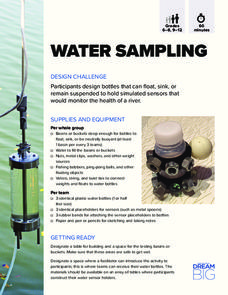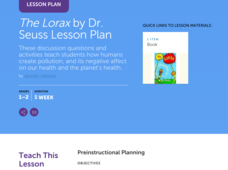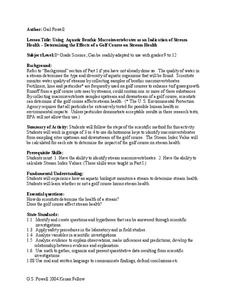DiscoverE
Water Sampling
What is the best way to test water quality? Using plastic bottles, scholars create monitoring sensors to test water quality. Creating three different sensors allows individuals to measure water quality at different water levels.
Polar Trec
Why Can’t I Eat This Fish?
Can turning on the television lead to toxins in the food supply? The lesson plan offers an opportunity for young scientists to complete guided research. A worksheet lists each question as well as the web page necessary to answer the...
NOAA
It All Runs Downhill
Examine how pollution makes its way into an ocean with help from a model watershed. Scholars use household items to recreate a mini-watershed, equipped with pollutants, that when mixed with rain drain into a model's body of...
Global Oneness Project
Reclaiming Rivers
Robert Hass's article "Rivers and Stories" underscores the importance of rivers in the development of civilization and the importance of reclaiming supposedly dead rivers and implementing policies that protect river health. Groups...
Pennsylvania State University
Learn, Protect, and Promote Water
A hands-on activity helps learners explore the water cycle. After discussing how they use water, classes discuss water pollution and then move into a simulation where 20 pupils move through the water cycle based on description cards.
Teach Engineering
Aerogels in Action
Model an oil spill cleanup. An engaging engineering lesson has groups using aerogels to simulate an oil spill cleanup (vegetable oil in water). Along the way, they learn about nanotechnology and hydrophilia/hydrophobia.
National Institute of Food and Agriculture
Water Pollution Demonstration
Water pollution is everywhere, and pollutants range from oil to fertilizers. Bring the concept to life by demonstrating the difficulties in getting particular pollutants out of water.
National Institute of Open Schooling
Water Pollution
Fifteen million children under the age of five die each year due to diseases in their drinking water. Water pollution is the topic of lesson 34 in the series of 36. Scholars, through reading and discussing, study numerous aspects of...
Scholastic
The Lorax by Dr. Seuss Lesson Plan
Celebrate the whimsical world of Dr. Seuss with a lesson that features the memorable tale of The Lorax. After listening to a riveting read-aloud, scholars take part in a grand conversation about the story and environment. Then...
NOAA
Biological Oceanographic Investigations – Keep Away
As of 2015, there are 53,481 oil wells in the Gulf of Mexico. Scholars determine how species diversity is impacted based on the ecosystem's distance from a drilling platform. It focuses on finding the mean of data sets...
SRI International
Fine Filters
Need to know where your class' knowledge stands? Use these pre- and post-tests to determine your learners' knowledge about nano membranes and nano filters in relation to the filtering of water, specifically contaminated water.
NOAA
The Dead Zone
The fifth installment of a 23-part NOAA Enrichment in Marine sciences and Oceanography (NEMO) program defines dead zones and how they form. Pupils then examine data from the Gulf of Mexico to determine dead zone formation.
Wilderness Classroom
Pollution
Educate scholars on pollution—air, water, and land—with a series of lessons that begin with a thorough explanation of each type. Learners then take part in three activities to reinforce the importance of reducing pollution. They...
Kenan Fellows
Determining the Effects of a Golf Course on Stream Health
Do golf courses affect the water organisms in nearby streams and ponds? Small groups collect samples of water upstream and downstream from a golf course and analyze the macroinvertebrates found and the stream index values of...
Kenan Fellows
Using Water Chemistry as an Indicator of Stream Health
Will this water source support life? Small groups test the chemistry of the water drawn from two different sources. They then compare the collected data to acceptable levels to draw conclusions about the health of the source. The...
Kenan Fellows
Effects of a Golf Course on Stream Health
Is the golf course causing issues in the stream? Find out with a resource that has groups perform chemical water tests to analyze the effects of a golf course on a stream. Pupils collect water above and below the course and analyze the...
EduGAINs
Go H2O! Investigating Residential Water Systems
Before your learners excuse themselves to get a drink at the water fountain, prompt them to think about where that water comes from. A middle school science lesson encourages groups to research their community's source of drinking water,...
Curated OER
Global Environmental Issues: Air and Water Pollution
Thinking about designing a project for your social studies or environmental science classes? Use an overview of a project that prompts class groups to research an environmental issue.
University of Florida
Protecting Our Water Resources
Teach young environmentalists to protect their planet's resources with a set of interactive experiments. Kindergartners and other youngsters learn about watersheds and the water cycle, while older elementary learners focus on fertilizer...
NASA
The Case of the Wacky Water Cycle
Join the tree house detectives in learning about the processes of the water cycle, water conservation, water treatment, and water as a limited resource.
Salt River Project
How Do We Clean Polluted Water?
How do we clean up oil spills and other pollutants in the water? Explore water treatment strategies with a set of environmental science experiments. Groups remove oil from water, work with wastewater treatment, and perform a water...
Marine Institute
Water Pollution
Sixth graders investigate the various types of pollutants found in water and ways to help prevent water pollution. Through a hands-on experiment, students create samples of polluted water by mixing water with vegetable oil, dirt,...
Earth Day Network
Filtering Water
See the water filtration system up close with a fun science experiment. Young scientists work for several class periods to design a water filter using household objects, and then decide which filter material would be most effective...
Texas Commission on Environmental Quality
Environmental Sciences
Whether you are teaching environmental science in junior high or studying recycling in kindergarten, there is something for all in this set of lessons designed for environmental education. The 110-page packet comes with tips for...

























